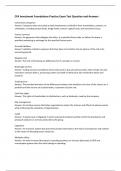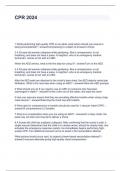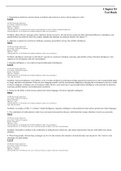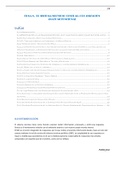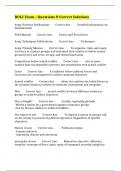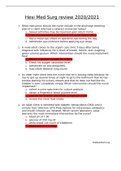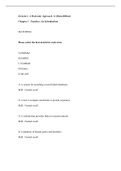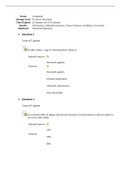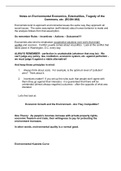Nudge:
Essay plan (effectiveness of nudge)
-Pros: If firms are using this (advertising- emphasises short term benefits, enhances
behavioural biases), government needs to use similar tools to combat, cost efficient solution
(no major changes, also no implementation costs- one-shot). Seemingly evidence for-
pension policy (fairly universal agreement), organ donation (but actual registrations!),
education vs short term economic needs in developing countries, can be staggered within a
policy area (e.g. smoking policy- ban for minors, plain packaging nudge for adults),
psychological basis well founded (of each of the biases, observed anecdotally as well)
-Cons: Ineffective- only used in certain areas (those areas where quick fixes are effective
may be the areas where policy is less important e.g. fruit/veg, food hygiene ratings, simpler
interventions), not for e.g. firearms, finite (once opt out, what’s next), paternalism, impinges
on autonomy, non-transparent, policymakers may have bias (rationality paradox-
inheritance, status quo bias), even if effective no more so than what came before because
essentially just an extension of it, counterargument to autonomy point- feel like autonomy
is being taken away, but doesn’t actually remove any options (neutral choice!), libertarian
paternalism (affect behaviour but make sure freedom of choice remains), but question- are
these fundamentally compatible? (Thaler and Sunstein 2008)- also said in their book that
you can also nudge in harmful ways (how can we be sure? Rationality paradox argument).
Amount of options you have with nudge not that large (default, framing etc.). Evidence not
that clear, and sources of evidence- Halpern obviously trying to justify BIT. Measurement
problems- test with RCTs, but more noise in real world. Also question about changing
behaviour short term, or can change people’s behaviour in long term (seems like a short
term fix). Immunity to nudge (e.g. personalised letters for tax collection, only a certain
amount of times you can do, people might become aware! Trying to help people make
decisions but in an unconscious way), “think” strategies- epistemic, moral, citizen
engagement (Paternalism argument- for nudge state acts as an expert, whereas think, just
creates new institutional spaces)
“Institutional consequences of nudging”- nudges don’t exist in a vacuum, broader
framework in which nudges work, no legal framework for nudge atm in many countries
(noncognitive level, manipulative), need to ensure there is a better framework
Intro: What is nudge, uptake, some evidence working
First para: Evidence- mixed, who does it comes from, what policy areas (doesn’t work in all-
some policy areas too salient/ideological/complex)
Second para: Rationality paradox, not effective if designed by biased policymakers
Third para: Only short term implications, what is the future for nudge
,The ethics of influence: government in the age of behavioural science. (Sunstein, 2016). Chapter 1-
The Age of Behavioural Science
-Behavioural research being used by for-profit companies (to make money), charities (similarly to
increase donations), government (to promote goals like poverty reduction, increased employment,
cleaner air, higher turnout…)
-Ethical constraints- line between coercion (certain forfeits if they refuse e.g. employers that
threaten employees with losing their jobs if they do not perform an action, jail) and influence (still at
liberty to refuse)
-But influence can still have strong effects e.g. millions of copies sold of Carnegie's 1936 "How to Win
Friends and Influence People", Cialdini's 1984 book "Influence" (six principles including reciprocity,
social proof- if many others think something, others will be inclined to think it too, scarcity)
-When does influence become manipulation?
-Ethical framework for states focus on 4 values: welfare, autonomy, dignity and self-government
(may be tensions between the first 2 and last 2)
-Doesn't just exclude certain actions, they also require governments to act positively. "People who
are subject to violence, uneducated, or desperately poor cannot be autonomous, or cannot enjoy
such autonomy as they may have" (case for social support, welfare state/libertarian paternalism?-
exactly what Thaler and Sunstein advocate in their book "nudge"- LP a "nonintrusive type of
paternalism because [it is not] forbidding any options of significantly changing their economic
incentives". Contract to get out of state of nature- Hobbes? Subjects are sovereign so still self-
government, each person with each other agrees to bilaterally lay down their rights). Question of
the each of government, some people distrust it. But minimal government needed at the very least
for "protecting property rights and…enforcing contracts".
-Nudges become more popular because of downsides of government intervention (infringe on
autonomy and unintended consequences e.g. bans opening up black markets).
-Nudges include reminders and default options
-Choice architecture = background conditions for people's choices
-UK has its own "nudge unit", in 2015 Obama issued an executive order committing the US to uses of
behavioural sciences
-3 initiatives in US: In 2010 federal reserve board adopted an opt-in rather than opt-out for banks for
overdraft programmes to protect consumers from high fees (UK- opt-out pension plans, SAVINGS-
people don't save as much as they should); 2014 Food and Drug Administration revised its nutrition
facts panel to mitigate the effects of "time-inconsistent preferences…visceral factors e.g. hunger, or
lack of self-control" (try to encourage cold state behaviour; we already know food policy is political
see week 12 reading, honest broker, nutrition report is a political product. Also there are markets for
these kinds of things/commitment devices. Nutrition apps, nutritionists, tech- CES in US where app
shows you what you would look like if you worked out x more times a week); 2014 FDA proposed to
assert authority over a range of tobacco products, because consumers might suffer from "problems
with self-control, addiction, and poor information…time inconsistency" (but outright ban? Some
consumers might not suffer from behavioural biases? And could create black markets, or shadow
markets if not technically illegal. Also, quite a low bar if government can intervene when consumer
does not have 'full information'- who really does?)
-Consumer Financial Protection Bureau in US- uses behavioural research to protect consumers in
financial markets
-White House Social and Behavioural Sciences Team (SBST)- helped "more members of the military
service to save for retirement (simple, just one email detailing steps to enrol for workplace saving
plan), more students to go to college, more veterans to take advantage of education and job-training
benefits, more farmers to obtain loans, and more families to obtain health insurance"
, -UK first to create a Behavioural Insights Team in 2010 (now partly privatised), informed policies on
smoking cessation, energy efficiency, organ donation, consumer protection, tax compliance,
pensions (opt-out).
-(At time of writing), 136 nations had incorporated behavioural findings into some aspects of public
policy
-EC report- Green Behaviour, Norwegian group GreeNudge
-Nudge in areas of poverty and development, 2015 World Bank report stressed importance, nudges
can increase take-up rates of existing programmes to combat the issue
-Ethical issues: Nudges may be unwelcome in countries with a history of authoritarianism e.g.
default rule to vote for incumbent party (turn on whether welfare, autonomy, dignity and self-
government are preserved- if so, government may not be fulfilling its ethical obligations if it does
not nudge people to act in their interests e.g. automatic vote registration (trial in Oregon) --> self-
government). Can do sort of cost-benefit analyses for each of the four (e.g. does policy promote
dignity or reduce it). "The line between influence and manipulation is not always clear".
-Some advocate "active choosing" as a solution e.g. prompting people to consider healthcare plans
early on in their employment, encourage them to indicate what they want themselves
-"All government action, including nudges, should face a burden of justification (and sometimes a
heavy burden)", implies justification should take one of the four lines (but most things can be
twisted to encourage one of these?)
-Eight principle conclusions:
1. Nudging cannot be avoided, all governments engage in some form of choice architecture
2. We should not abstract about ethical objections to nudges, objections should depend on the
specific form
3. It might be an ethical failure not to nudge people with warnings about something that could
be to their detriment (welfare)
4. Some nudges "promote autonomy by ensuring that choices are informed", or do so by
"free[ing] people to focus on their real concerns"
5. Good choice architecture promotes dignity by allowing people to be agents and expressing
their will
6. Self-government legitimates or forbids certain nudges e.g. those extending the franchise vs
incumbent party candidates being "listed first on ballots…their names in an appealing colour
or a larger font" (is this not obvious?)
7. If choice architect does not have illicit ends and their decisions are justifiable and
transparent, there should be few ethical objections (but who is free of bias?)
8. Fine line between nudges and manipulation e.g. advertising
Nudge Nudge, Think Think: Two Strategies for Changing Civic Behaviour. (John, Smith and Stoker,
2009)
-Two methods to promote better policy outcomes- nudging citizens using behavioural economics
(Thaler and Sunstein) or deliberative democracy, where citizens can think through and debate
solutions.
-Changing citizens' behaviour key for: obesity, climate change, crime, binge drinking, community
cohesion. Can be achieved through government intervention constructing 'choice architecture' that
encourages citizens to act in a way that encourages benefits for themselves and their fellow citizens,
or citizens ("given the right context and framing") collectively thinking themselves towards solutions.
"Nudge" v "think".
-Other methods still around i.e. regulatory and economic instruments (e.g. payments for households
generating electricity through solar panels, ended in Dec 2018). But costly/difficult to enforce, or
people may not comply because they do not recognise the rule as applying to them or are



